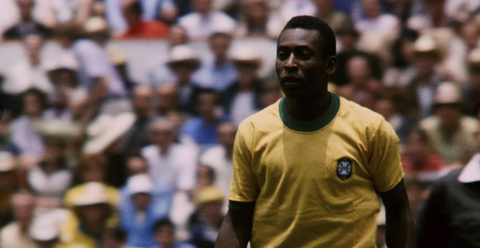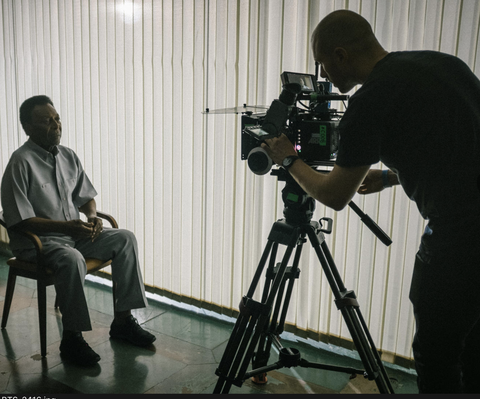Usually, when you ask an athlete how they felt about winning the big thing—a championship, a rewriting of the record books, what have you—they’ll just tell you that they’re happy that they won the big thing. Or that they deserve their respect. (LeBron.) Maybe that they want to do it again. (Tom Brady.) Or, my favorite, that ANYTHING IS POSSIBLE! (Kevin Garnett.) In Pelé, a new documentary about the legendary Brazilian footballer, Pelé talks about winning the 1970 World Cup in a way you’ll rarely hear an athlete say out lout.
“Relief,” Pelé says of the defining match of his career, looking like he’s still thanking his lucky stars that June 21 brings memories of greatness, not disaster.
If you know anything about Pelé, you probably have an idea why he’s not spewing clichés of joy 50 years later. Yes, Netflix’s documentary, which is out this Tuesday, recaps the stats and the wins and the myth of the charismatic Pelé, who’s amongst one of the greatest to ever play his sport. But throughout its interviews with the man, who is now 80 years old, directors Ben Nicholas and David Tryhorn press him on the things that built up the kind of pressure that makes a match feel like it had life or death stakes. Mainly? The fact that Brazil was under a military dictatorship at the time of the 1970 World Cup. At the time, people criticized Pelé for not using his social status to speak out against the dictatorship—maintaining a largely apolitical facade when many thought he could strike a blow against the country’s leadership.
Whereas The Last Dance, at times, went a little easy on Michael Jordan’s politics—Nicholas and Tryhorn press Pelé to the point where he stops giving the stock answers that he’s probably had memorized for a half century. At one point, they ask him if he knew about the reports of torture and cruelty by the dictatorship. “If I were to say now that I had never been aware of it, that would be a lie,” Pelé admitted. “There was a lot we never got to find out, but there were many stories too.” In advance of the documentary’s premiere, we asked the directors how they got the endlessly-interviewed Pelé to finally open up.
This content is imported from YouTube. You may be able to find the same content in another format, or you may be able to find more information, at their web site.
ESQUIRE: The scene where Pelé sits down with his old teammates and eats with them—it was incredible.
David Tryhorn: It was such a special day. People forget that Santos was one of the greatest club sites of all time. And unbelievably, most of the key players are all still alive, despite the amount of time that’s passed since they played together. We wanted to show a slightly different side of Pelé. Like all those greats, and with the passage of time, you start to become a bit establishment, you start to turn up to all these FIFA events in a nice suit. Ultimately, he’s a Brazilian guy who much prefers wearing a t-shirt and shorts and flip flops. We wanted to show him in that environment as one of the boys… It was fun because we actually had to persuade him for quite a long time to do it. I think he was worried the emotions of the occasions would get the better of him. But we’ve since been told by the small team of people around him that he now looks back at that day as one of his favorite days of the last year.
Ben Nicholas: It’s funny because the film was almost a bigger reflection of that, because we knew he’s someone that’s been interviewed so much over the years. So putting him in environments that you’re not used to seeing him, but also that blended into asking him questions that he’s not used to being asked. We always said to him, “We don’t want the same old story.” Yeah. He has probably manufactured some answers over the years that he just keeps as his stock replies to stuff. So we had to really make sure that we were getting the new version of that, not the same old story, but going deeper.
ESQ: Looking backward at some of the best sports documentaries of the past few years—what you wouldn’t give to see that in The Last Dance, though I know a lot of those guys wouldn’t get in the same room together now. The archival footage was also incredible. Even as far back as the ’50s, it felt movie-like.
DT: The challenge is, you’re dealing with events from 70 years ago. You’re dealing with a global figure… It was a real hunt. I think the beauty of some of the old footage, people used to shoot on film, so once you can scan that, that footage can look sensational. The downside is, you don’t have the guy with the camcorder, like in The Last Dance recording everything with all the audio intact. So I guess our challenge was finding these fragments of small shot film pieces and start building these slightly more coherent scenes, rather than have montages the whole time. But it was certainly fun. The treasure trove of footage kept dripping in week by week, month by month.
ESQ: I mean, the matches alone. You managed to splice together multiple camera angles for some moments. It just felt entirely removed from what I would expect to watch a 1958 match.
DT: The 1970 World Cup feels like it was shot yesterday. It’s just so beautiful and so vivid. You capture the emotion of the whole occasion, don’t you, Ben?
BN: Yeah. Along with the ’84 Olympics in LA and the ’70 World Cup, I think are the two most beautiful-looking official film footage surrounding a sporting event. Because these days it wouldn’t be shot on film. It would all be shot on digital. All the official footage you get from those events will end up feeling quite digital these days and quite TV. There’s something about Mexico in ’70 with Pelé looking so spectacular. That kit is the best kit of all time. Under the Mexican sun. Everyone in the crowd looking so beautiful. It’s just a beautiful cocktail of things coming together there.
DT: And we knew as soon as we saw that ’70 footage we just knew that that had to be the climax of the film. When we were originally structuring how this film would be and whether we were using the World Cups as these milestones, it was very, very obvious the footage was that incredible that ’70 had to be the end piece for us.
ESQ: The film is a very tight story—where it really does hone in on his career, with a little bit of childhood and politics. Was there a temptation to go more into Pelé’s late career?
DT: The Studio 54 New York days were quite luring, but once a player stops playing, then you’re going into failed relationships. And you lack that proper narrative arc. I think it was crucial for us. What we really wanted to do when we set out to make the film in the first place was contextualize Pelé, to tell people why this guy was so important, why he gained his mythical status. We look at this guy—he’s a myth. It’s Pelé. He’s the greatest ever. As time goes on, I didn’t really understand: Pelé gets written out of these various arguments as to who was the greatest. And I think it was so important that we just focused on this very defining era. Not just for him, but for Brazil as well. And it just felt perfect the way you’re looking at this birth of Pelé alongside the birth of Brazil as a modern country.
BN: And that’s why I think it was also key for us to have Pelé in the room and get him on camera, because a lot of docs these days will be just [archival footage]. We always felt it would be a strength of the film if we can get him almost giving his last will and testament, and allowing the audience to feel like they get to know him over the film.
ESQ: You guys push him in ways that people really haven’t been pushing athletes in documentaries the past few years. You really do go there on the political end.
DT: When you think about it, every time Pelé has left the house he’s had a microphone in his face. He’s done thousands and thousands of interviews. The plus side of that is nothing’s really off limits. He’s heard it all before, so he doesn’t really mind you asking him whatever. The downside of it—he has stock answer after stock answer and he knows how to get rid of the uncomfortable question. And you’re also in this weird thing of he’s dealing with stuff from 50, 60, 70 years ago. Are we hearing what actually happened or these memories of memories? So I think the key thing for us was to just push him. We had several days with him across 18 months. And you’d have days where he didn’t want to know and we would leave it alone. And then we had days where it’s like, We’ve hit something here and we can push him. It was very important for Ben and I to make sure that, as much as this is a celebratory film of his career, this isn’t a hagiography. I think we’re trying to make Pelé a very human character. When someone is human, you have to dig into their flaws, and it was important for us to constantly dig and push. Certainly on those political questions.
BN: It was trying to explain the myth, but also humanize the myth. In the moments that we do push him quite hard, it was always key for us to not feel like we were taking a side, or trying to put words in his mouth, or trying to speak for him. But I think just try to show both sides of the argument. This guy, as I said, was so built for the era he explodes into in the ’50s. We often said he was almost like an older Hollywood studio system kind of guy. He’s got that kind of feel about him. But when the world starts to change in the mid-’60s, maybe he starts to feel out of step. Or maybe he becomes out of step when you’ve got figures like Muhammad Ali coming onto the scene and really challenging the establishment. Pelé has created this character for himself—which doesn’t really allow him to do that. And does he want to do that, or should he do that? He’s the symbol of this country. Can he become divisive? All those things, I think, are weighing on him. Ultimately, he decides to go his way and stick with the character. But we try not to say whether that was right or wrong, or better or worse. We just try and make you feel like by the time we get to ’70, he’s got a decision to make. Can he step up to the plate again?
ESQ: You’re right: You don’t unfairly contextualize it alongside Ali. You don’t say, “Oh, look at him not being the modern NBA athlete,” or something like that. But you still push him appropriately and get him to say, “Could I have done more?”
BN: And that’s it, because all these modern athletes—some of them are doing just amazing things in comparison. But they’ve got examples to look up to. They’ve got other people doing things and saying, “Oh, shit. I like what he’s done. I’m going to try and do something similar.” Where there was no one for this guy. He was the first global sports superstar. And he was walking a path no one else had walked. I think he’s in a difficult situation that way, because I really felt he felt equipped to become this divisive character. As I say, I think that’s especially hard if you’ve got a whole country on your shoulders and you’re the king and everyone’s looking to you to make them feel good. To suddenly pivot and be something else—I think it would have put him in a very awkward situation.
ESQ: That’s why the last moment in the documentary, where Pelé says that he felt relief when he won the last World Cup—I think is the one-word answer to that. In the moment, what did you guys make of it when you heard him say that?
DT: I think it’s such a telling line… Pelé creates this feel-good, everything’s-okay character. He’s always been perfect on the pitch. I think he expects that he should always be perfect, and that’s what people want from him. I think in that moment, you’re expecting Pelé to go, “It was fantastic. It was wonderful. It was the best moment of my life,” instead of him saying, “Relief.”
DT: You really do feel there is a slight melancholy to the film and to hear his interview at times. I think you really do get that sense of this is a weight off the guy’s shoulders. And remembering that in 1970 he was only 29. Even I’m guilty of thinking he’s this real veteran at the end of his career, doing this great thing for Brazil. And it’s like, he’s only 29. I wish I was 29 again… I remember when he said that. You have one of those little quiet fist bump moments. I was like, Yes, nice, nice. Leave enough of the dramatic pause now.
ESQ: Is there anything else you’d like to talk about that we didn’t get to?
DT: It’s a film about identity as much as anything. Pre-’58 Brazil is not the country of football. It has some issues with its own self-worth as a nation. Post-’70, the first thing anybody in the world thinks about with Brazil is football. And that’s down to one guy. So without ’70 at the end, Brazil doesn’t become Brazil, Pelé doesn’t become Pelé. So that’s the rubber stamp, not only on his identity as this mythical figure, but it’s the rubber stamp on Brazil’s identity and an identity which he helps create. I think by helping create that sense of national identity, he foregoes his own identity somewhere along the line—which I think maybe explains some of those apolitical bits we were talking about earlier.
BN: He must go into the final in ’70 knowing all that stuff. So the pressure he must be feeling is that he knows: This is basically immortality for me and the whole country getting back on its feet. To go into a game, and not only play well, but create magical timeless moments within that? We can say he was a lovely guy, he’s a normal guy, he’s a humble guy. But that’s something else. He’s not normal in that way. That’s genius.
This content is created and maintained by a third party, and imported onto this page to help users provide their email addresses. You may be able to find more information about this and similar content at piano.io








